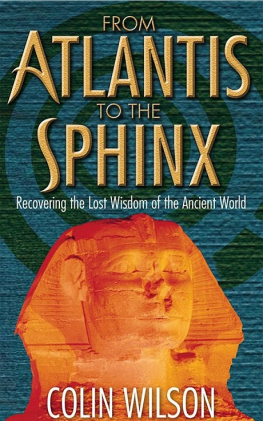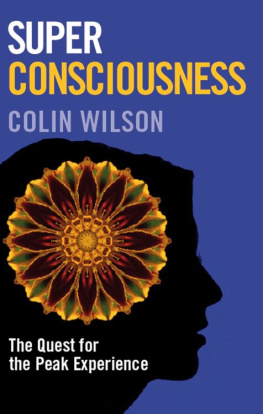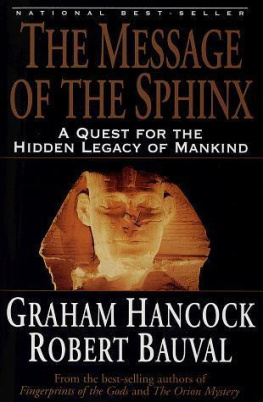Introduction
My own part in this quest began in July 1979, when I received a review copy of a book called Serpent in the Sky , by John Anthony West. It was basically a study of the work of a maverick Egyptologist called Rene Schwaller de Lubicz, and its central argument was that Egyptian civilisationand the Sphinx in particularwas thousands of years older than historians believe. Schwaller had devoted the latter part of his life to demonstrating that the ancient Egyptians possessed a grand, interrelated and complete system of knowledge. The passage that excited me so much was on page 198:
Schwaller de Lubicz observed that the severe erosion of the body of the Great Sphinx at Giza is due to the action of water, not wind and sand.
If the single fact of water erosion of the Sphinx could be confirmed, it would in itself overthrow all accepted chronologies of the history of civilisation; it would force a drastic re-evaluation of the assumption of progressthe assumption upon which the whole of modern education is based. It would be difficult to find a single, simple question with graver implications. The water erosion of the Sphinx is to history what the convertibility of matter into energy is to physics.
The problem is that although this final chapter of the book is called Egypt: Heir to Atlantis, it actually says very little about such a possible link. The most important comment about this occurs in the Introduction:
Following an observation made by Schwaller de Lubicz, it is now possible virtually to prove the existence of another, and perhaps greater civilisation ante-dating dynastic Egyptand all other known civilisationsby millennia. In other words, it is now possible to prove Atlantis, and simultaneously, the historical reality of the Biblical Flood, (I use inverted commas around Atlantis since it is not the physical location that is at issue here, but rather the existence of a civilisation sufficiently sophisticated and sufficiently ancient to give rise to the legend.)
So West was not, in fact, necessarily talking about Platos mythical Atlantis, but simply about this possibility that civilisation may be millennia older than historians accept. In which case, there is a sense in which what has been called the dreaded A word (which entails the instant assumption that its user is a member of the lunatic fringe) may not be necessary at all. We are not talking about the fictional Atlantis of Vernes Twenty Thousand Leagues Under the Sea or Conan Doyles Maracot Deep , but simply about the possibility that human culture may be far older than we believe.
Now, at the same time as I received Serpent in the Sky , another publisher sent me the reissue of a book called Maps of the Ancient Sea Kings , subtitled Advanced Civilisation in the Ice Age , by Charles Hapgood, a professor of the history of science in New England. Like West and Schwaller, Hapgood had also come to accept the notion of an ancient civilisation that pre-dated dynastic Egypt. Hapgood had arrived at his conclusion by a completely different route. He had studied medieval navigation maps called portolans, and concluded from certain of them that they had to be based on far, far older maps, and that the South Pole had been mapped in the days before it was covered with ice, possibly as long ago as 7000 BCthree and a half thousand years before the Great Pyramid. But Hapgood takes great care not to suggest that his ancient maritime civilisation might be Atlantis, or even to breathe the word.
Hapgoods quest began with the so-called Piri Reis map, dating back to 1513, which shows the coast of South America and the South Polemany centuries before the latter was discovered. I had heard of the Piri Reis map via a popular bestseller called The Morning of the Magicians , by Louis Pauwels and Jacques Bergierthe book that had started the 'occult boom in 1960as well as in the work of Erich von Daniken: both had tried to use the map to prove that earth must have been visited by spacemen in the remote past. I was perfectly willing to be open-minded about the possibilityas I still ambut it seemed to me that their arguments were simply untenable, and in Danikens case, often absurd and dishonest. Now I was interested to learn that the argument for an Ice-Age civilisation did not depend on ancient astronauts, and that Hapgoods reasoning was cautious, sound and logically irrefutable. As far as I could see, he had proved, once and for all, that there had been a maritime civilisation in the days before the South Pole was covered with ice.
But I had other work to dofor example, writing an enormous Criminal History of Mankind and pushed aside the whole question of Atlantis.
In the autumn of 1991, I was approached by the Hollywood producer Dino de Laurentiis, who was thinking of making a film about Atlantis, and who wanted to try to give it a realistic historical approach. He and his associate Stephen Schwartz commissioned me to write an outline. Naturally, I decided immediately that I would base it on John Wests theory.
In November 1991 I found myself in Tokyo, taking part in a symposium on communication in the twenty-first century. In the Press Club, I spoke about my Atlantis project to some friends, and mentioned Schwallers theory that the civilisation of ancient Egypt was the heir to Atlantis, and that the Sphinx could date thousands of years earlier than 2400 BC, which is when the pharaoh Chefren is supposed to have built it. At which point my host, Murray Sayle, remarked that he had recently read a paragraph in the Mainichi News that claimed there was new evidence to support this view. Naturally, I was excited, and asked him if he could find me the item. He promised to try, but was unsuccessful.
A week later, in the Savage Club in Melbourne, I mentioned the elusive paragraph to Creighton Burns, the ex-editor of the Melbourne Age , who said that he had also seen the story about the Sphinx. He tracked it down in a recent issue of the Age , and was able to give me a photostat.
It was from the Los Angeles Times of 26 October 1991, and read:
EGYPT SERVES UP NEW TWIST TO MYSTERY OF THE SPHINX
San Diego, Wednesday
New evidence that Egypts Great Sphinx may be twice as old as had been thought has triggered a fierce argument between geologists who say that it must be older and archaeologists who say that such a conclusion contradicts everything we know about ancient Egypt.
Geologists who presented their results at the Geological Society of America Convention yesterday found that weathering patterns on the monument were characteristic of a period far older than had been believed. But archaeologists and Egyptologists insist that the Sphinx could not be much older because people who lived there earlier could not have built it.
Most Egyptologists believe that the Sphinx was built during the reign of the Pharaoh Kafre [Chefren] in approximately 2500 BC. But scientists who conducted a series of unprecedented studies at the Giza site said their evidence shows that the Sphinx was already there long before Kafre came to power.
The evidence suggests that Kafre simply refurbished the Sphinx.
Boston geologist Robert Schoch said his research suggests that the Sphinx dates back to between 5000 BC and 7000 BC. That would make it double the age of the Great Pyramid and make it the oldest monument in Egypt, he said.
But California archaeologist Carol Redmount, who specialises in Egyptian artefacts, said, Theres just no way that could be true.
The people of that region would not have had the technology or the will to have built such a structure thousands of years earlier, she said.
Other Egyptologists said that they cannot explain the geological evidence, but they insist that the theory simply does not match up with the mountains of archaelogical research they have carried out in that region. If the geologists are right, much of what the Egyptologists think they know would have to be wrong.












